Who would have guessed that FromSoftware would go on to make a dent on the global game development scene when it dropped Demon's Souls? A seemingly inconspicuous title upon release, it spawned a game formula that has evolved and enthralled more and more with its sophisticated sequels. The games test your resolve with a blend of unbearable frustration and profound jubilation, which few games can achieve effectively. This isn't even mentioning the extensive lore, gorgeous locales, and dark, fantastical art direction.
It's no wonder, then, that we see the Souls series all around us, whether it be in the creation of blatant homages like Nioh and Lords of the Fallen or as subtle influences in the likes of Shovel Knight and Dying Light. The impact of Miyazaki's brainchild cannot be understated, and while many are aware of the meat and potatoes in the Souls series' soup, we want to shed a little light on some of the spices that don't get as much recognition.
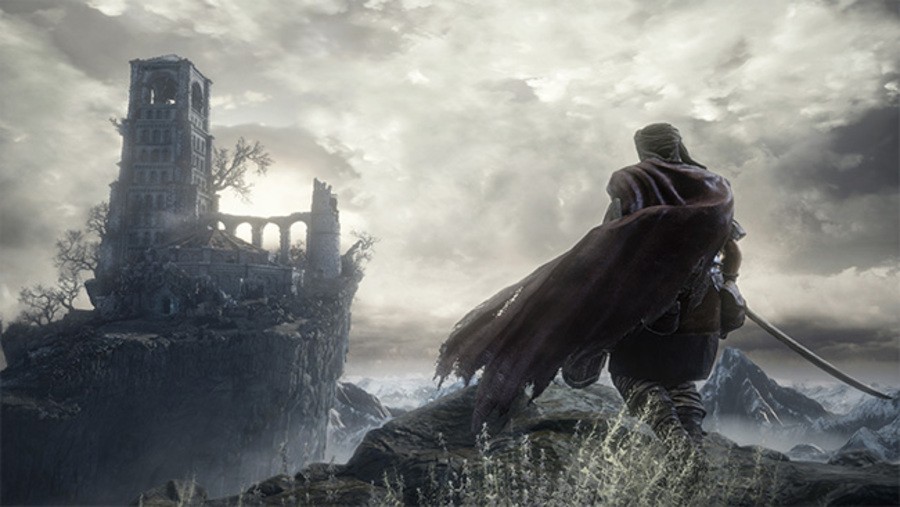
The Music of Silence
It makes sense that developers almost always pack long stretches of gameplay with music. We're used to recognising themes on every route and city in the Pokémon series, and you'll no doubt hear familiar tracks as you travel and battle through The Elder Scrolls V: Skyrim. Music has a way of alerting us to details, like entering a certain location and knowing when a hostile presence is present or vanquished. It's traditionally meant to complement the nature of the moment and thematically mirror the nature of what you're doing or where you are, so FromSoftware utilises tracks sparingly with hub worlds and bosses to amplify these contextual effects.
We're comforted more while seeking refuge in Majula to a melody of soft, warm chimes. Fighting Gehrman is all the more chilling as you're treated to an epic, orchestral piece charged with more emotion than usual. However, in between the musical lows of safety and highs of bosses, you have nothing to reflect on but the ambience of the environments, the choir of your enemies' howls, and the beat of combat during normal gameplay. This forces you to focus on the sound design, and by strategically listening for sound cues during battle or wondering what could be echoing in the distance, you become more involved in the exploration and your surroundings' mysteries. I know my interest is piqued by the absence of music, and the Souls series only increases this by making it the norm. So whenever the music hits, it's actually a reward for progression in itself.
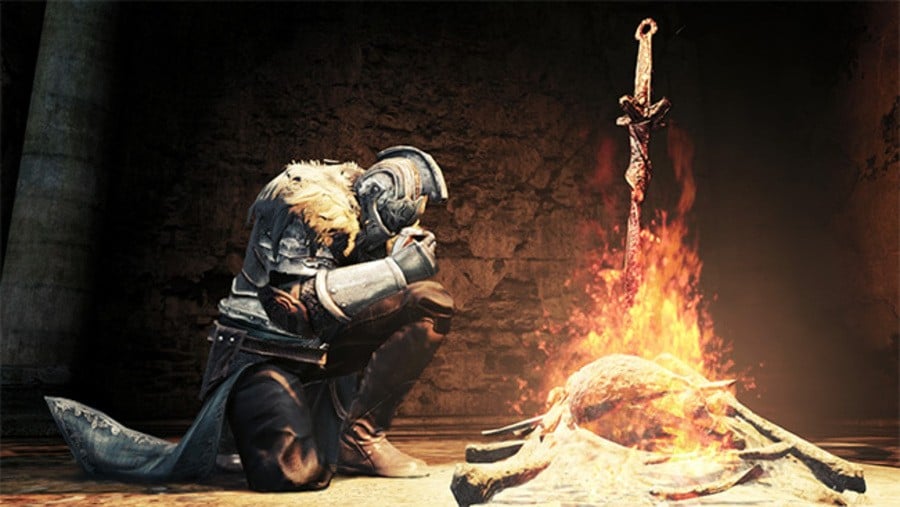
There Will Be Consequences
We've been accustomed to making up for mistakes with checkpoints and save files without penalty. I know I've made use of this with games like Dishonored and The Evil Within whenever I messed up an elaborate plan or wasted too many supplies, but some developers take these liberties away like Telltale Games with its episodic series, but you can still replay entire sections if you want to slog through them to patch up a foolish decision. However, the Souls series resurrects a principle from the bygone pixelated era. Do you remember when a lot of cartridge games didn't have save files? You had to play through the entire thing and live with whatever mistakes you made until you reached the end or not. While the Souls series reasonably grants us the ability to save our progress, it's set up in a similiar manner: every moment cannot be undone.
If you accidentally kill an NPC, the games automatically save. If you are unexpectedly launched off a ledge by a grunt while seeking to gain back a stockpile of souls you've lost, they are gone in that instant. Just as there's no margin for errors in the franchise's combat, the save system is equally brutal. The consequences are immediate and permanent, which means that if you want to go back just a minute before you increased a stat, you're out of luck. Even minor decisions during character interactions you've likely forgotten can come back to bite you by not being granted an important item or causing some NPCs to force you into duels. With such an unpredictable, unalterable future, every move you make is always worth paying attention to throughout these adventures with a keen eye, which is an uncommon attitude to demand of players in an age of hand-holding and convenience.
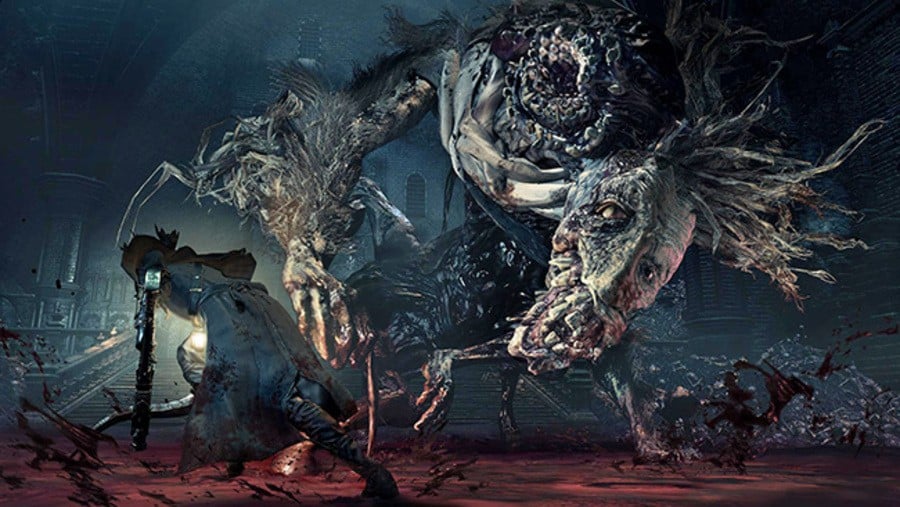
All-Encompassing Narratological Purpose
Why do you regenerate health as a normal human in first-person shooters? How does one literally unlock talents from a skill tree? There are aspects about games that are simply "game-y", which end up feeling out of place or awkward when they present themselves seriously. Booker DeWitt eating food out of the trash to regain health in BioShock Infinite is a good example to say the least. In the end, we have to suspend our disbelief when someone like your agent in The Division is somehow able to carry hundreds of pounds of items. While the Souls games actually ignore that last detail, too, they are nevertheless consistent about giving logical purpose to anything "game-y".
Checkpoints take the form of bonfires that are essential to light not just for gameplay's sake, but for the story's sake. In Demon's Souls, your soul is sent back to an Archstone upon death since you're connected to the Nexus, and you must recover your acquired souls where your Bloodstain is, which explains respawning. Leveling up in Bloodborne isn't just some abstract system tacked on, but is narratively sound in being about increasing your connection with the memories of your victims through their Blood Echoes, thereby making you stronger. Generic items and weapons can also reveal integral information behind the vague storytelling of the series, and that's not including how the intricate placement of environmental objects and elements contributes to this, too. Even multiplayer is deeply embedded in all of the stories' folds, which is just one out of other examples proving that Miyazaki is highly concerned about constructing consistent universes that make sense when channeled through the rules and mechanics of game structures.
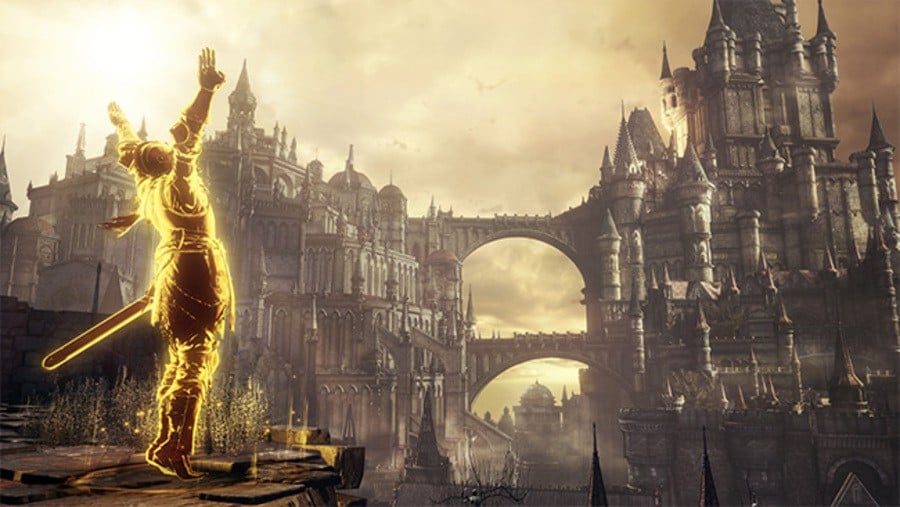
The Power of Landmarks and Interwoven Worlds
A sign of brilliant level and environmental design is when you need not rely on objective markers or a mini map, but instead can use your surroundings to get an idea of how to reach new destinations. FromSoftware is one such developer that understands this, such as by providing glimpses of the Bell Tower of the Undead Parish as you climb your way there in Dark Souls. Slowly making your way to the ship in Dark Souls II's No-Man's Wharf is a fun process as you go this way and that with the ship in view the whole time. Whether it also be Demon's Souls' Tower of Latria or the Djura's Tower in Old Yharnam, landmarks are a natural yet undervalued way of monitoring your progress and positionally situating yourself in these games.
What comes with this slowly growing knowledge of the world are epiphanies where you suddenly connect the dots with certain areas. The Souls series, much like Ratchet and Clank and The Legend of Zelda, is great about taking you off the beaten path for some time and looping foreign areas back to a familiar place. It's pleasantly surprising to say the least, which should give anyone an appreciation of how this contributes to retaining the excitement of exploration. After all, while your educated guesses of where you are may be well founded, FromSoftware will not fail to make you exclaim in wonder when its mad, twisting worlds reveal their hidden, thoughtful coherence.
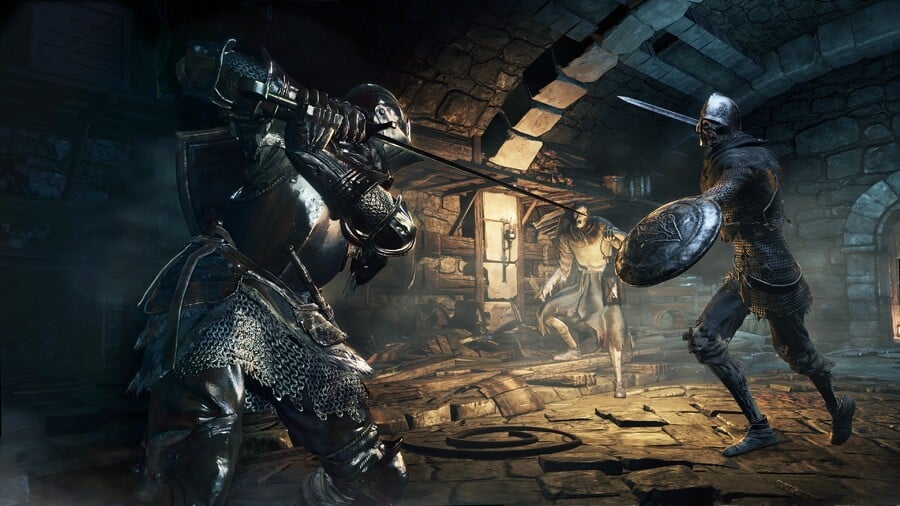
Intricate Choreography of Motion
If there's one aspect of FromSoftware's games that you must adjust to, it's the animation. Never have I played games that so cleverly deceive me with how and when new types of opposition will unexpectedly feign strikes or frantically lash out at me. Even with Demon's Souls, I marvel at the time variations in how long foes will take to strike with a weapon or spells, which never fails to make me second-guess if I'll parry or dodge at the right time. You truly have to study their patterns down to the milliseconds, and even then, how AI behave next can still catch you off-guard. It demonstrates how your skills and reflexes aren't the only things that are meant to be hard-pressed by this deceptive developer. It has always intended to psychologically trip you up, too.
This isn't limited to your enemies, but also your own character. The effective usage of some weapons can require exceptionally accurate and almost prophetic vision since some attacks can take up to two to three seconds to come around full circle. You need to know how long your heavy and light attacks take in order to effectively unleash them on adversaries when they're open, in addition to how precisely long it will take to dodge, heal, and more during brief moments when they lie back. Because of this, many would rightly argue that the Soul series should run at 60 frames-per-second for optimal experiences, but thanks to painstakingly elaborate animations for you and your opponents, gameplay doesn't play like a jerky, unpleasant mess. It can look and feel like beautiful dances with death that can take your breath away.
What did you think of these points made about the Souls series? Are there some you agree or disagree with? What subtleties would you introduce to this list? Prithee share your own thoughts in the comments section below.





Comments 17
A bloomin' great read! Really interesting angles mate.
Yeah, this is a great article @DrJoeystein. I've honestly never thought about some of the things you mention here, especially the way the music fades out entirely at times. Really interesting.
Fantasic article, I love how your doing your best to draw people's attention to the elements which make the SoulsBorne games so special. It's a really sad reality that so many players (and arguably elements of games media) are blinded by the difficulty of the SoulsBorne games (which is already exaggerated I feel) and fail to notice the amazing design features which makes them so unique, the interlocking world design (best in the biz as far as I'm concerned), the gorgeous soundtracks, the wonderful sense of discovery these games foster, the both equally lovable and terrifying co-op system (which could be explained better in game I feel). These are special games as far as I'm concerned and the only games where I really wish more people would play and give a chance.
What makes the Souls series as good as Zelda for me?:
just a few things
@Hego People think the combat is too hard and unfair while its one of the fairest and coolest combat systems in the industry. It's more about overcoming fear. More people are able to beat these games than they themselves think.
Wonderful article and a worthy of thy series ,what caught my sight recently is the music but all of the article points i can relate to, what a wonderful series in the history of video games and I'm truly glad i have a ps4 just because of bloodborne and fromsoftware truly made me appreciate my hobby of playing video games.
@BenTarrant Thanks, Ben! By the way, I've got to say that I love the avatar. One of my favorite movies!
@get2sammyb Thanks as well, Sammy! Yeah, I didn't notice a lot of these things either until I really thought about them for this article. It was hard to come up with some because so many people have already done excellent dissections of the series, but since I've been playing Demon's Souls recently and noticed how the series has these recurrent subtleties, I was able to pick up on them more easily. Glad you liked it!
@Hego I've considered doing a piece on things I hate about the Souls series (still love the games, of course!). How the game doesn't explain things well like multiplayer would be one point. I get the whole vague angle that FromSoftware is coming from, but with regard to using some items, putting together some aspects of the stories, explaining other mechanics and features, and so on, the Souls series is too vague to the point where many have to rely on external sources to play the game more effectively...which is a sign of lackluster communication to the player in the games' design.
Anyway, you cover some things I love about these games, too. And yes, people saying this game is so hard is another thing I hate. That's not the fault of the games themselves, but everybody makes them out to be these hellish titles that are no fun. They're honestly no harder than playing some first-person shooters or action-adventure games on the hardest difficulty. The Souls series just makes progress slow and steady because it requires precision and patience on the player's part. So it's largely not unfairly challenging, just demanding. I actually stayed away from the games for a long time because of the reputation they had, but once I got into them, I was irritated at how people made them out to be! I wish a lot more people knew what these games were really like.
@AyeHaley Ah, wonderful points! You've got a beautifully condensed list on what makes these games awesome at their cores. By the way...
"People think the combat is too hard and unfair while its one of the fairest and coolest combat systems in the industry. It's more about overcoming fear."
YES, YES, AND YES. Although I do think the games are a bit mischievous with the difficulty at times with some unfair things, as a whole they're exceptionally fair. You can only blame yourself when you die in combat.
@Illusionistt That's great to hear! Thanks for the compliment, too. I'm a bit embarrassed to say this...but even though I've played all the Souls games, Bloodborne is the only one I've managed to finish. They're so long, and I've gotten badly stuck in all of them except for Bloodborne! I need to go back and finish them all. At least I'm getting started by playing through Demon's Souls right now!
@Bad-MuthaAdebisi It's so scary when that happens. It'll honestly jolt me out of my couch whenever I encounter a new enemy that does that! And yes, besides the technical issues (frame rate woes are the major issue that hold Bloodborne back a hair, for example), the series is exceptionally consistent in maintaining its reputation with the slight exception of Dark Souls II for some folk (I have yet to play through the whole thing to make my own judgment).
I've tried playing Demon and dark souls 1/2. I've gotten about 1/3 of the way in each but I just don't get enough carrot to keep going. The story telling is great showing rather than telling, and the gameplay is solid enough but I get the same sensation as when I did accounting courses; I could keep going but I'd rather do something else. I wonder what the personality is of people who enjoy these games is like.
@sonicmeerkat Personally, I generally get very frustrated with difficult games, but for whatever reason, these ones don't annoy me. I dunno what it is... I quite like the slow but steady progress, which is bizarre, as I hate it in other games.
It's a fact that if the souls games had quick save nobody would ever have though of the games as hard.
Great article! Only just really started Dark Souls 2 but already loving everything about it! And supposedly this being the weakest of the series, I'm excited to experience the others
I really want to play Bloodborne as the art and monsters look amazing but if I am honest, the difficulty does put me off. At most I get 1-2 hours whenever I do get to game due to kids etc. I worry I will just get frustrated with multiple replays and learning the paths/enemies.
I was first introduced to the souls series by watching Tyrannicon videos on YouTube. My first hands on experience was bloodborne and now I'm loving dark souls 3. It's probably the first series of games I've truly loved since my introduction to Zelda through the Ocarina of time. i would actually say bloodborne and dark souls have given me hope for the gaming industry which I think is generally awful these days.
@Rudy_Manchego You should definitely pick it up. In my opinion Bloodborne was the easiest and most accessible of the games, and considering it is set in a different world from the main series it's a great point to jump in.
As for the difficulty and replaying sections, don't worry about that. This is a core mechanic as it allows you to learn how to fight certain enemies, attack patterns and when to strike back without risking your precious souls/echoes.
Dying and replaying sections is genuinely not that frustrating since you always learn something new from each death. And since you can call in buddies to help it should makes things a little easier.
I seriously hope you put the difficulty out of your mind and give it a shot because personally I would rate them some of the best and most beautiful (in so many ways) games I have ever played.
@fairliedaft I think you may have swayed me...hopefully being fair warned will get me through the my typical frustrations. I remember first playing Shadow of Morder and not getting the nemesis system. I was hacked off before I realised that I had to play differently and I would be punished for charging in. Once I did, I had a ball.
@Rudy_Manchego I'm glad to hear that! I liked the nemesis system in Shadow of Mordor. It was a really interesting mechanic that worked really well. Unfortunately the game itself just didn't really suck me in, just felt too generic to me.
Anyway, enjoy Bloodborne buddy, it's truly brilliant.
Ill be honest.
I hated Dark Souls.
I didnt really understand the systems in place and such.
Fast forward to Bloodborne, and boom, Im all of a sudden in love with it!
And as a result, since they added the very real option of being agile into Dark Souls 3, Im thoroughly enjoying it too.
Show Comments
Leave A Comment
Hold on there, you need to login to post a comment...